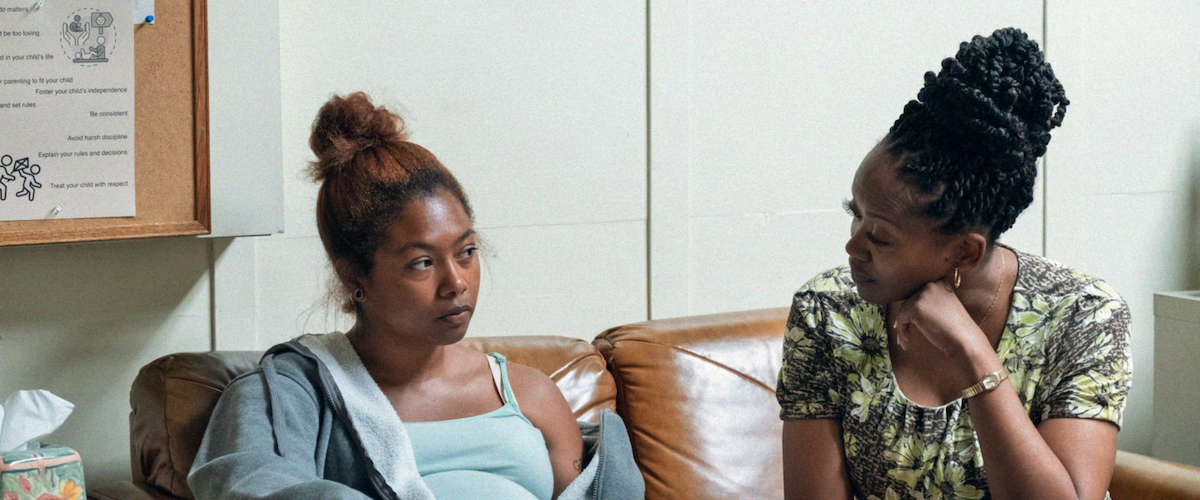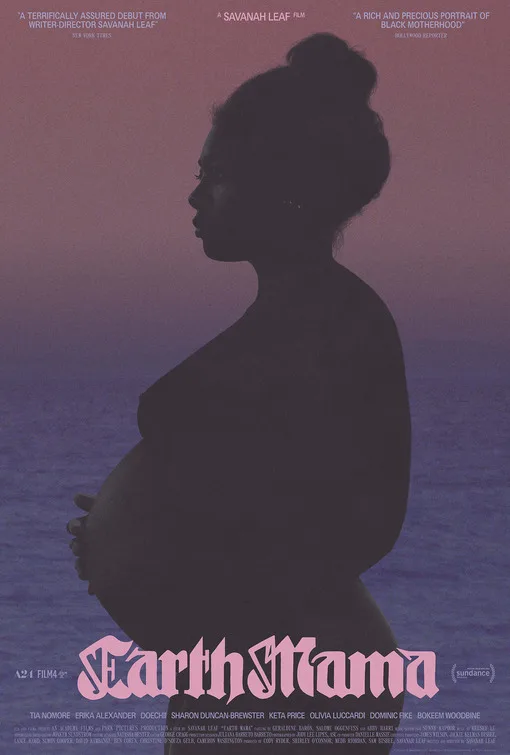Olympic volleyballer, photographer, and now writer/director Savanah Leaf launches herself into the cinematic sphere with her devastating feature debut, “Earth Mama.” Gia (Tia Nomore) is a pregnant woman fighting for custody of her two children in the foster care system. As she treks through each day, trying to tick all the boxes under the “fit mother” checklist, she fights not only against the system itself but her struggles and the ideals set by the culture in which she lives. Not only do her born children hang in the balance, but the future of her unborn child, due any day, is up in the air.
Depending on the eye of the beholder, Gia is damned if she does and damned if she doesn’t. But her love is undeniable, compelling her to try and find a solution. This world of crushing expectations, down to earth but spotlighted by Leaf’s storytelling, sets the stage for a film that quietly but vividly spins a narrative of Black womanhood and strength against the odds.
The profundity of “Earth Mama” is carried from screen to soul with piercing silences; the film’s sound design is commanding in its restraint. A great percentage of the film is so quiet, whether in true silence or dialed-back ambient noise, that such aural unfamiliarity punches with full force. Gia’s distractions are what’s afforded noise, rowdy neighbors, or gatherings for cars doing donuts, but these moments are fleeting. She is surrounded by quiet in any moment of emotional bearing, whether solo or in conversation, allowing the script’s incredible dialogue to demand center stage.
“Earth Mama”’s muted energy is further supported by its cinematography’s homemade quality. Nuance forms the core of “Earth Mama” and is conveyed by restrained dream sequences that portray womanhood at its most stripped down, with social ties and contexts completely severed. Whether Gia is slowly walking through the forest, her naked pregnant body amid true nature, or standing in front of a mirror, pulling her rotting umbilical cord from her body, both depict a pure animalism that is awe-inspiring in its beauty and gore.
Leaf’s close-ups are equally as poignant as the film’s silence. They insert us into Gia’s interiority, highlighting the delicate details of expression and the female form. “Earth Mama” thrusts the viewer into unforgiving empathy, to feel every beat of Gia’s heart as it races and stalls with the weight of her circumstances. Generational trauma born from the responsibilities of motherhood in the cycle of economic oppression is a cornerstone of the story. Equally potent is the inherited battle of a mother’s love versus her child’s resentment under these circumstances. As this web of emotions is spun, Gia and the other women in her circle find that in their adulthood, their roles have reversed. Now, they are on the other side of the table.
But the unforgiving devastation that comes with the film’s ebbs and flows is compelling, not forced. The slow pace of “Earth Mama” and its hushed formal execution trust its lead performer to hold the line and Nomore beyond exceeds. Leaf’s impeccable writing also assists her, but her translation is marked by stunning, gut-wrenching naturalism. Nomore is soul-shattering and true; her anger is felt as equally as her loving conviction. She excels with such a balance. The film is chock full of torment, painful uncertainties, and pleading support for Gia. But Nomore’s performance, coupled with the script’s thoughtfulness and underpinnings of hope, keep Leaf’s debut worlds away from misery porn.
“Earth Mama” is an unflinching, authentic portrait of when motherhood, sisterhood, and womanhood converge with class and race. It beautifully showcases the support system of Black women across all avenues, as well as empathetically depicting where beliefs diverge within communities. Bolstered by expert empathy, understated direction, and evocative performances, “Earth Mama” highlights resilience while whispers of social misogynoir are incorporated without abandon and confronted head-on by the film’s women. Whether Gia is stewing in indignation, anger, or hope, the throughline is her love. In a society that doesn’t value or support Black women and families, she feels that her love has nowhere to go but into the ether.
Now playing in theaters.




















